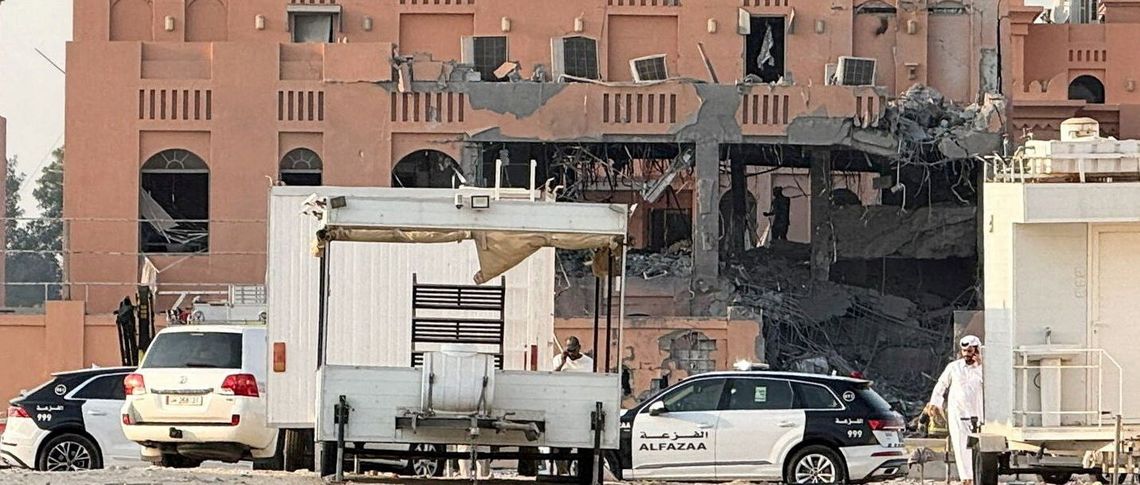Israel crossed another red line with its air strike on Hamas negotiators in Doha. In the Middle East right now, international law and the rules governing relations between states are increasingly giving way to a situation in which ‘anything goes’. But such a strategy of naked violence is the high road to anarchy. Arab capitals long regarded Iran as the unpredictable ‘rogue state’, but Tel Aviv is now commandeering this role. Normalisation of relations with the Arab world, first and foremost with its leading power, Saudi Arabia, is thus receding into the distance.
Some 1 700 kilometres separate Israel and Qatar. It’s been clear since the Twelve-Day War with Iran and the massive bombardment of Tehran that this is now no obstacle to the Israeli air force. Geographically, the Gulf emirate has long been in Tel Aviv’s crosshairs. Even more significant is the fact that Qatar is the first ‘major non-NATO ally’ of the United States to be targeted. Not only is Doha a close ally of Washington, but it also hosts the largest US military base in the region, stationing over 10 000 US troops. Qatar is thus an unusual new entry in the ever-growing unofficial list of ‘bombable states’, which formerly included only failed or enemy states.
Qatar represents a red line: the embassies in Riyadh, Ankara and Cairo are now on notice that, if it comes to it, they are no longer off limits. Sovereignty and the inviolability of borders increasingly count for little in the Middle East. Israel seems to have learned this from its archenemy Iran.
Stifling any chance of negotiations
The recklessness of the attack stands in sharp contrast to its lack of success. According to the Qataris, the air strike did not strike Hamas’ leadership in exile, but only some subordinates. But even a failed attack still represents a blow to the negotiation process itself and is yet another sign that Netanyahu’s government is indifferent to the fate of the hostages. Self-evidently, there is no thought of any ceasefire. The attack on Doha also comes at the same time as the internationally condemned offensive against Gaza City, in which over a million war-wounded and refugees face displacement once again. International escalation is clearly very useful in deflecting attention from war crimes committed there. Whatever Israeli propaganda may say, Qatar is no ally of Hamas, but merely harbours its exiled leadership at the express wish of the United States. This is precisely to keep open communication channels that are now being shattered by a barrage of missiles.
Israel has nothing to offer its neighbours besides bombs, state collapse and subservience.
What is the point of negotiating when the real aim in Gaza has long been to stymy any post-war order? Militarily, stepping up hostilities makes no sense. Hamas no longer exists as a coherent military force and represents no existential threat to Israel. In Gaza’s post-apocalyptic wasteland, it is little more than a scattered guerrilla force. The Israeli government has no wish to end the war politically because its aims go far beyond defeating Hamas. There is to be no ‘day after’ in Gaza, even though alternative Palestinian and regional actors have long awaited it. Instead, the blueprint being followed is the Trump plan to displace the Palestinian population en masse. Only this can explain the systematic destruction of all human and natural resources, far beyond any possible military need. Israel’s Orwellian Newspeak frames this as ‘voluntary departure’ for Somaliland, Libya or South Sudan.
The air strike on Qatar has given the moderate Arab states due warning that they too are in the crosshairs of Israel’s military might. No US protective shield can help them, as there is a clear hierarchy among Washington’s allies. The Emirate has invested up to a billion dollars in an elaborately refurbished jet for President Trump. This was clearly a massive waste of money. The order that has crystallised in the region since 7 October 2023 is one of Israeli supremacy with virtually no military restrictions. But although the Jewish state is certainly dominant, it is no hegemon. A hegemon would have to offer the region a positive vision, at least in part, one that is also in the interests of the satellite countries. By contrast, Israel has nothing to offer its neighbours besides bombs, state collapse and subservience.
But Israeli supremacy is built on feet of clay. Protracted war on every flank risks overstretching the 10 million-strong state with its reserve army, both militarily and economically. This can be sustained only with massive Western, especially US, support. Netanyahu has cleaved to the United States like no other prime minister before him. Every reckless step makes the implicit calculation that the global hegemon will stand by its primary ally, come what may. As was already the case under Biden, so it remains under Trump: US Middle East policy is made in Tel Aviv. The tail is wagging the dog, to coin a phrase. As in the case of Iran, an Israeli military strike is once again scotching a US-led negotiation process.
The US is losing control — and trust
Meanwhile, resistance is mustering in the United States itself. No one in the region believes the official position that Washington was told only when the Israeli bombers were already in the air. In the Gulf, the strike on Qatar represents a massive loss of trust in America. As in the case of Iran’s attacks on Saudi oil installations in 2019, once again, the global hegemon has shown that it cannot protect its allies. This time, however, it is not about deterring an enemy, but about losing control over one’s own partner.
If not in the Washington power centre, at least in its immediate vicinity, people must be asking whether Israel is still a geostrategic asset. Hasn’t it rather long since become a burden, keeping the global power bogged down in the Middle East when it would prefer to pivot towards Asia, all the while alienating its allies and turning global opinion against it? Such doubts are extending far beyond the left wing of the Democratic Party. In the very heart of the MAGA movement, prominent ideologue Steve Bannon has attacked Netanyahu and reproached him with turning Israel into a ‘Jewish Pakistan’. As in the case of Iran, a weak-looking Trump is coming under pressure from among his own people. The former cross-party consensus on unconditional support for Israel is now beginning to crumble.
Palestinians are suffering not only beneath the cloak of Western double standards, but also in the shadow of Arab inertia.
The attack on a residential area of Doha is a wake-up call for the Gulf states and their efforts towards security and stability. It clarifies two things: first, the Israeli war can no longer be confined to Gaza and the Levant. Inevitably, it is encroaching on the Gulf states, undermining their sovereignty and shaking the foundations of their statehood, peace and order. They are left exposed and defenceless. Second, Israel appears once and for all to have slapped aside the long-extended hand of a compromise peace. They even bombed the negotiation venue. Diplomacy could scarcely suffer a more symbolic burial.
Despite the enormous social upheavals caused by the horrific images from Gaza, Arabs were keen on a comprehensive regional peace up to the last. Riyadh and co. renewed the 2002 Arab peace initiative on a number of occasions, promising Israel full normalisation in exchange for a two-state solution. But instead of peace, Tel Aviv has burned its boats in favour of total dominance and militarily a free hand between the Mediterranean and the Persian Gulf. In its tunnel vision, the Jewish state sees not an outstretched hand but only new enemies, everywhere.
This puts moderate rulers in the Arab world in an uncomfortable position. To date, they have contented themselves with expressions of outrage, without pushing back against Israel’s war crimes and breaches of international law. Palestinians are suffering not only beneath the cloak of Western double standards, but also in the shadow of Arab inertia. Now that they have a target on their own backs, however, inaction is no longer a sustainable option. If they want peace and a regional order of their own making, they can no longer remain mere bystanders. It will soon turn out whether the Arabs resume a more active role or allow their humiliation to continue.






